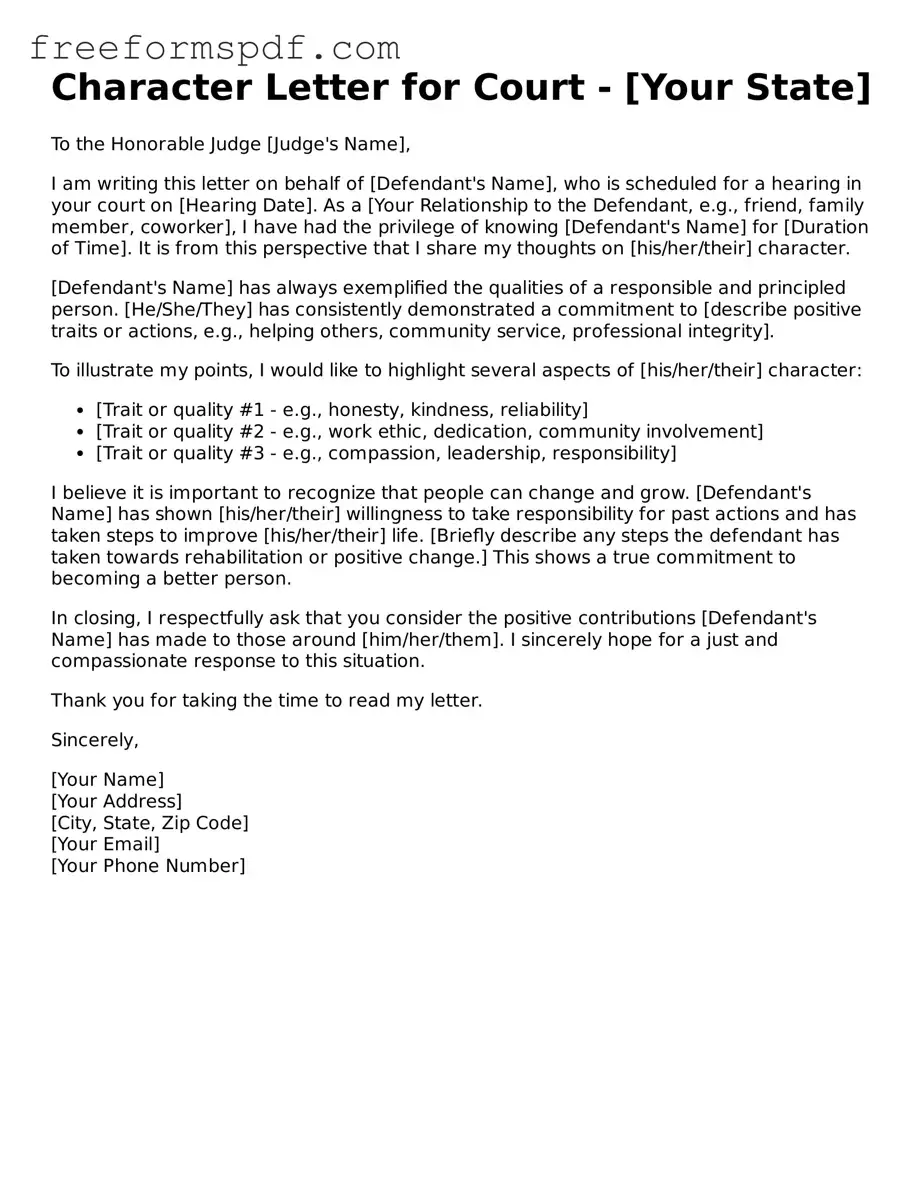Character Letter for Court Document
Common mistakes
-
Not addressing the letter to the correct recipient. It is crucial to know who will be reading the letter. Make sure to address it to the judge or the specific court handling the case.
-
Failing to provide specific examples. General statements about a person's character may not be as impactful. Including specific anecdotes or examples can illustrate the individual's qualities more effectively.
-
Using inappropriate language or tone. The letter should maintain a respectful and formal tone. Avoid slang or overly casual language, as it may undermine the seriousness of the letter.
-
Neglecting to proofread. Spelling and grammatical errors can detract from the letter's credibility. Always review the letter carefully before submitting it to ensure clarity and professionalism.
-
Not including personal contact information. Providing your contact details allows the court to reach out for any follow-up questions. Omitting this information can hinder communication.
Learn More on This Form
-
What is a Character Letter for Court?
A Character Letter for Court is a written document that provides a personal account of an individual's character. It is typically submitted to the court during legal proceedings to offer insight into the person's behavior, values, and contributions to the community. The letter can come from friends, family members, employers, or anyone who knows the individual well and can speak positively about their character.
-
Who can write a Character Letter?
Anyone who has a personal relationship with the individual can write a Character Letter. This includes family members, friends, teachers, employers, and community leaders. The key is that the writer should be familiar with the individual’s character and can provide a credible account of their positive traits and contributions. It is important that the writer is not directly involved in the case to maintain objectivity.
-
What should be included in the Character Letter?
The Character Letter should include several key components:
- The writer's relationship to the individual.
- Specific examples of the individual's positive traits or actions.
- How the individual has positively impacted others or the community.
- A statement of support for the individual, particularly in relation to the legal matter at hand.
It is also advisable to keep the letter respectful and sincere, avoiding overly emotional language.
-
How long should the Character Letter be?
Typically, a Character Letter should be concise, ideally one to two pages long. The focus should be on quality rather than quantity. A well-structured letter that clearly communicates the key points will be more effective than a longer, rambling letter. Aim for clarity and relevance to the case.
-
When should the Character Letter be submitted?
The timing of the submission is crucial. The Character Letter should be submitted to the court before the scheduled hearing or trial date. This allows the judge to consider the letter as part of the overall context of the case. It is wise to check with the legal representative or court guidelines to ensure it is submitted in a timely manner.
Misconceptions
There are several misconceptions surrounding the Character Letter for Court form that can lead to confusion. Here are five common misunderstandings:
- Character letters are not important. Many believe that character letters have little to no impact on a court case. In reality, these letters can provide valuable insight into a person's character and may influence the judge's decision.
- Anyone can write a character letter. While it is true that anyone can write one, it is crucial that the letter comes from someone who knows the individual well. A letter from a credible source carries more weight in court.
- Character letters should be long and detailed. Some think that longer letters are better. However, a concise and focused letter that highlights key attributes is often more effective.
- Character letters can be submitted at any time. Many assume that there is no deadline for submitting these letters. It's important to check with the court for specific timelines, as late submissions may not be accepted.
- Character letters are only for criminal cases. Some people believe these letters are only relevant in criminal matters. In fact, they can be beneficial in civil cases as well, providing context about a person's character in various legal situations.
Other Types of Character Letter for Court Forms:
Letters of Support for Immigration - The letter may include testimonies from friends or relatives attesting to the couple's relationship.
The recruitment process into a fraternity often requires potential new members to submit various documents, among which is the vital Fraternity Recommendation Letter form. This form not only provides a critical endorsement from existing members but also highlights the applicant's unique qualities and character, showcasing their suitability and potential contributions to the brotherhood.
How to Write a Sorority Recommendation Letter - A note from a current member vouching for the applicant's potential fit.
